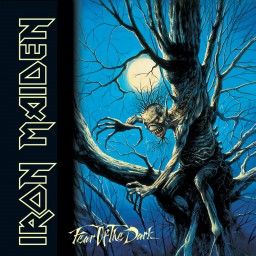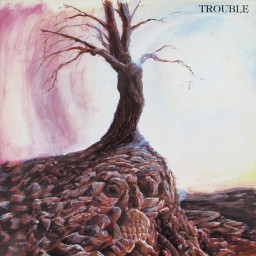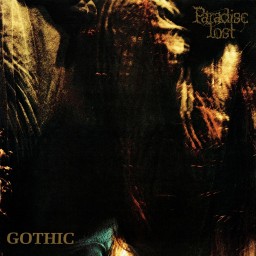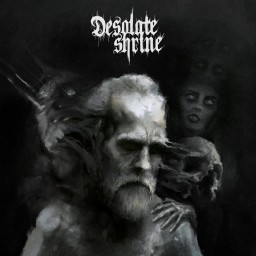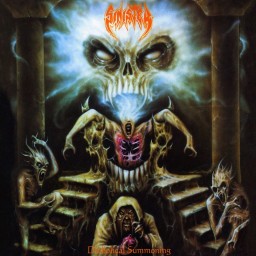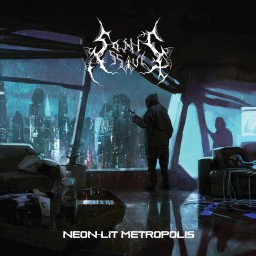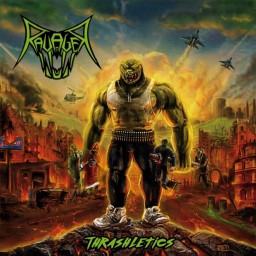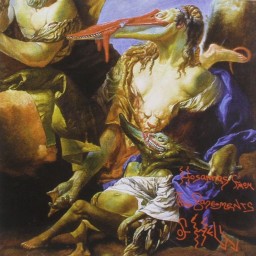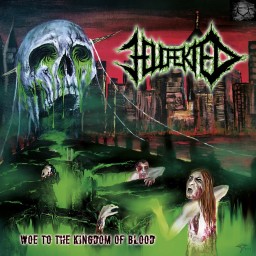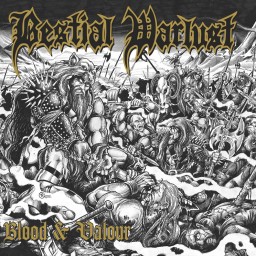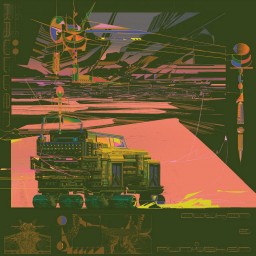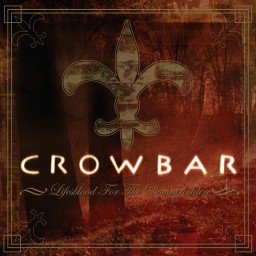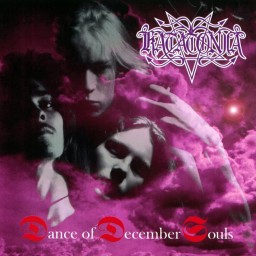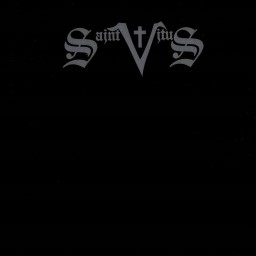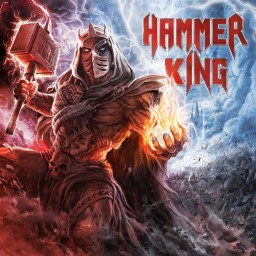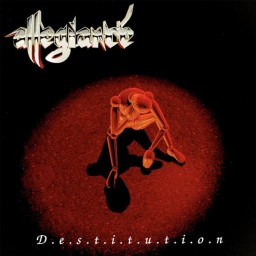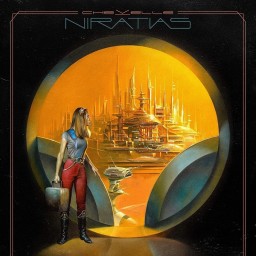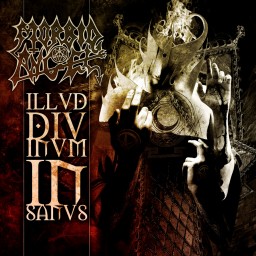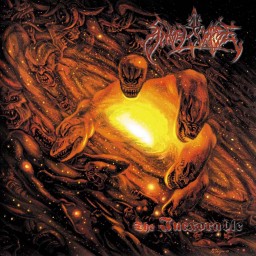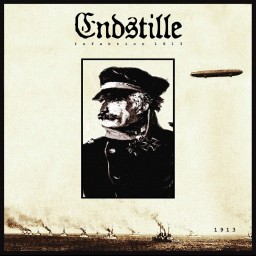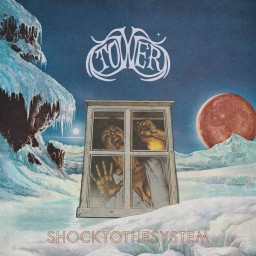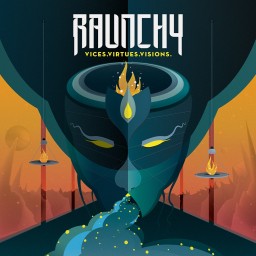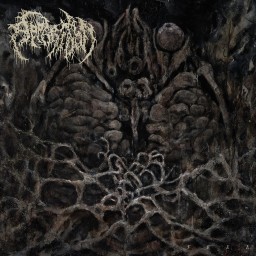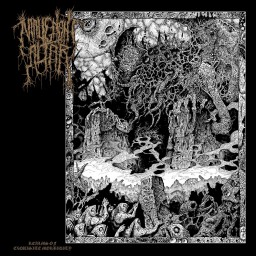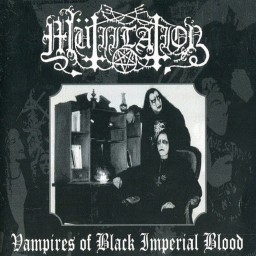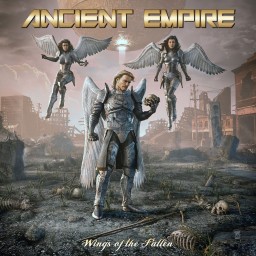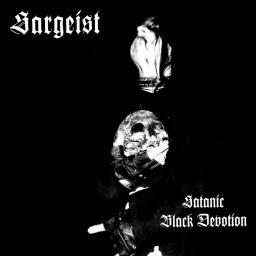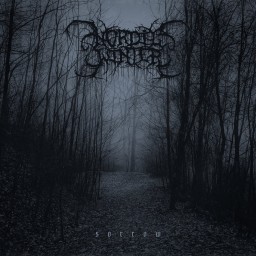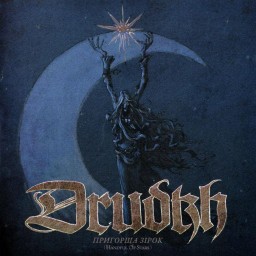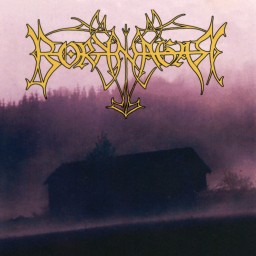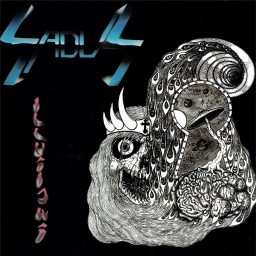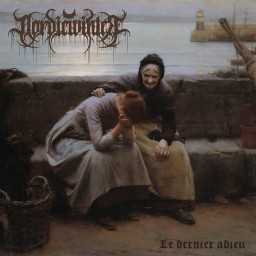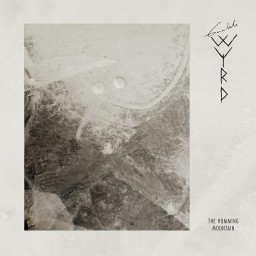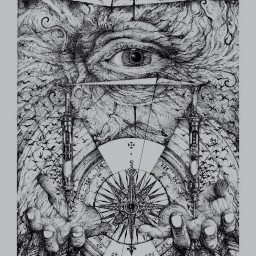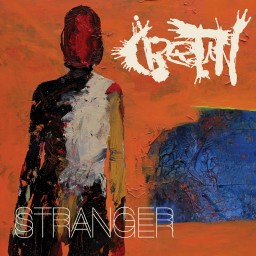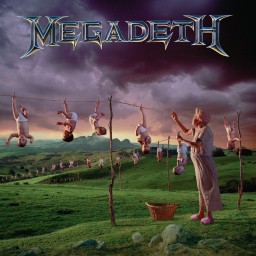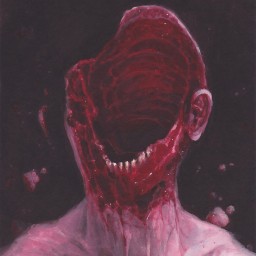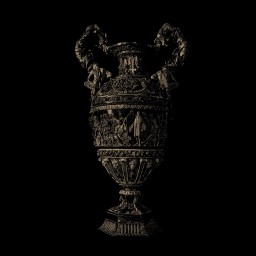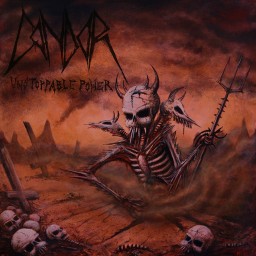Vinny's Reviews
Today we commemorate the final passing of Iron Maiden, some thirty years on from them being so cruelly taken from us by whatever it was they morphed into thereafter. I know that quality was waning on the previous release, but the fact is that No Prayer for the Dying and Fear of the Dark where both important albums for me as a youth, being the first two new albums from a band I had discovered via someone else's vinyl collection to date back in 1989 that I could go out and buy and discover at the same time as everyone else.
1992's opus was patchy to say the least. Opening track Be Quick or Be Dead set the bar low in all honesty and the anthemic From Here to Eternity lacked the same deftness to become a real Maiden banger as a Run to the Hills or Can I Play With Madness had achieved over the years. Things sounded a bit boring and upon reflection it is clear to see that this was the death knell for Dickinson and his first tenure with the band. He was critical of the studio (which Harris built in his own barn) and admitted that he felt the studio had limitations even though the overall sound was better than on the previous outing. Fact is though Brucie-baby that No Prayer For the Dying is a superior album both in terms of content and consistency. By the time 1992 rolled around there wasn't even anymore Tailgunner, Holy Smoke or Bring Your Daughter...to the Slaughter type tracks left in the tank.
As the album draws on, the filler starts to become glaringly obvious and the end result is an album that sounded like a band just going through the motions. Despite there being glimmers of the trademark sound and style lavished sparingly throughout the twelve tracks, I only find the title track and the opening two tracks to be of note. Although memorable (probably because 16 year old me would play the album to death), the rest of the album falls far short of Maiden at their best.
Genres: Heavy Metal
Format: Album
Year: 1992
Trouble's eponymous debut is a tale of two halves for me. The first half is me thinking that this is why I got into heavy metal in the first place. With its big riffs and lethal threat levels of groove and doom, there is little to argue with on Psalm 9 when it comes to the bangers such as album opener The Tempter, the charging triumph of The Fall of Lucifer or the epic gloom of Psalm 9. Both tracks are examples of the band at their finest for me and are tracks that represent the very essence of what doom metal should sound like. There is a vibrancy and energy underneath that requisite level of murk that shows a band with their artform flowing through their very veins. The riffs of Wartell and Franklin are huge and yet at the same time they are clearly players unafraid to mix it up and change pace and influence to inject some variety to proceedings. The vocal talents of the late Mr Wagner are accurately logged throughout history and it is hard to find a comparable vocalist, past or present that has such a unique and equally fitting style for their chosen genre of music. He is imperious here. His piercing yet gruff musings punctuate each and every song on here.
Arguably for me, this is also where the second half of my experience of the album comes from. As much as I admire Wagner's vocals the adoption of them on some tracks (in terms of the lyrical content and their delivery) is far too preachy for my liking. This is not a criticism that I level from the aspect of their being a large Christian focus on the lyrics here. Sharing aspects of your faith in your music is not something I have a problem with. Here though, there is an underlying naivety to the lyrics. Victim of the Insane is a bleating tirade from a vocal perspective, saved only by the superb lead work and accompanying tempo change that heralds its arrival. The raging Bastards Will Pay is another example of a song with a message to deliver but not quite having the maturity to tailor it to be less overwhelming. At times the messaging feels like it is from a gothic metal album as opposed to a straight up doom record. I acknowledge of course that this was a debut release and so the most likely of a band's discography to contain the rookie mistakes.
The above does not ruin the album for me by a long chalk. It is an issue that is reflected in my rating most definitely but there is still a lot to enjoy and praise here. Even the instrumental track that I normally dread on most records is interesting and totally in keeping with the album direction overall. The drumming of Jeff Olson could be represented better in the mix overall but I would not go as far to say that it is stifled to any degree, just a little too far back in the mix. As a benchmark doom record for the "Early Days" challenge in The Fallen clan, Trouble's debut album is a superb starter for ten for anyone wanting to dip their toe in these murky yet rippling waters.
Genres: Doom Metal
Format: Album
Year: 1984
I missed the boat completely on Paradise Lost. Back in the early 90s I somehow skipped the death doom / gothic metal combo of Halifax’s finest and went straight into the extreme depths of the likes of Obituary and Morbid Angel for my dm fixes. This is an important point to labour for my explanation for me coming around to doom as an over-arching genre so late in life. Paradise Lost like Trouble, Candlemass, Anathema, My Dying Bride and Cathedral were always a band I was aware of from virtually day one of my metal exploration, yet they ended up cast aside in favour of more intense extremity despite their obvious merits.
When I did finally get around to looking at them, they were releasing albums that most certainly did not sound like Gothic. This is both a good and a bad thing in so many regards. The production on Gothic is bordering on terrible. Guitars are buried under what sounds like layers of muck, with percussion suffering the same punishment also. Only Holmes’ death growls manage to sound coherent and beefy in this hideously constrained mix. I can cope with the weak and wobbly guitar melodies as they do carry some elements of authenticity to the more gothic tropes of the record, but their general lack of overall presence feels like daylight robbery. However, despite these challenges, the true dark power of Paradise Lost seeps through; almost as if consciously refusing to accept the prison walls in which the production entraps them, Paradise Lost persevere with a determination that belies the lack of strength in the album sound.
Enchanting and menacing in equal amounts, Gothic manages to be a success still even though it stands minus a limb to make its foundation solid enough to seemingly bear any weight. It does manage to hold structure on songs and set looming atmospheres also without ever becoming overly dramatic or theatrical. As a band that were already transcending a typical death / doom style their sophomore release manages to incorporate these less-extreme elements in a balanced enough format to hold the interest of this scribe at least. If you have chance to catch the version of the album with the bonus tracks you will catch this brilliance on Rotting Misery (Doom Dub), with the harrowing guitars and bone delicate piano keys complementing each other perfectly.
Even with the positives noted, it is hard to give Gothic a big score when it comes to an overall rating. The cruel sense of injustice as I consign this album to just three stars is a sensation that does weigh heavy on even my usually unforgiving shoulders. Mackintosh’s song writing ability is clear and present even at this early juncture, but it lacks a nurturing enough of an environment to be given the opportunity to really shine. Likewise, Holmes’ guttural performance intimates a promise simply stifled by clearly having a knob-twiddler at the production desk who had no idea what to do with this sound.
Genres: Doom Metal
Format: Album
Year: 1991
Desolate Shrine have bounced on and off my radar since 2012's popular sophomore release The Sanctum of Human Darkness. As Finnish death metal goes they are not quite as unique in their sound as say Krypts are, but they do still possess that punishing low end of death metal that is synonymous with the country scene and have forged a five album career in just over a decade. Fires of the Dying World is their first in five years yet does not sound like a band who have been apart for any length of time. Sharing members of Sargeist and Convocation (amongst other bands as well), Desolate Shrine sound as cohesive and mature on album number five as they always have. The experience of the group is obvious and despite their bm credentials, their sound has limited bm influence. Ranging from the familiar aforementioned Finnish sound to more of death / doom tempo over six tracks (and an acoustic intro that sets the scene nicely), Desolate Shrine have a limited yet effective variety in their kit bag.
What is obvious from track two onwards is that there is true power behind the riffs here. As we get to the slower tempo of The Dying World we start to really hear the bleak emptiness of the band's sound, using harrowing melodies and punchy riff patterns to drive home their darkness and this marriage of the more raw death metal riffs with the restrained and detailed atmospherics or melodies is the clever balancing act that the trio pull off here. By the time we roll around to the majestic riffing that comes in at approximately two thirds of the way through Cast to Walk the Star of Sorrow I am completely sold on this record. It might lack the dynamic and signature off-kilter rhythms and odd melodies of some of their contemporaries but fuck me does it have an attitude all of its own that is clear for all forty-six minutes of the record.
The previous two releases had shown a band going of the boil a little for me - certainly when compared with the debut and sophomore releases. The Heart of the Netherworld and Deliverance from the Godless Void never felt like complete offerings, certainly in terms of that cohesion that I mention early on on this review. Here the good ideas are part of a smarter concept overall and the highlights standout from a much more appealing foundation layer to begin with. Nice to see a band get back on course and show some real bite still.
Genres: Death Metal
Format: Album
Year: 2022
Probably one of the most under-appreciated death metal bands in the world, Sinister have been plying their trade for over thirty years. Whilst not consistent in their output for a number of years, they actually set a firm foundation for themselves in the early 90's with their first three albums carving out quite a name for the Dutch death metallers. With sophomore releases being the trickiest of any discography the band built on the success of their debut (which I vaguely recall) and whilst they did not necessarily better it they maintained that great trajectory going into their 1993 release.
For the uninitiated with Sinister, think Deicide, Malevolent Creation and the less predictable elements of early Cannibal Corpse and you are in the right mindset. They play that rabid death metal that I associate with the first two Deicide albums but possess a knack for delivering more structure to their riffing like CC did when they paused for breath. Opener Sadistic Intent is a CC like banger of an opener that straight away embeds deep foundations for what follows as Mike van Mastrigt's vocals take no time in bellowing their presence from the off.
He is backed up by a great set of musicians also. Andre Tolhuizen is a riffing machine who can fire his fair share of sonics when required and the percussive talents of drummer Aad Kloosterwaard are of the highest standard you would expect in the death metal world of the early 90's. Lost somewhere in the maelstrom is the bass of Bart van Wallenberg but it makes regular appearances out of the churning chaos of most tracks to let you know it is still there with the occasional echo of its rumble just audible around the periphery of proceedings.
Highlights? The relentless riffing of the title track will have any fan of death metal beaming from ear-to-ear for sure. The looming build of Leviathan is a pleasure to behold before it descends into rampant madness and the seemingly endless energy of Sadistic Intent all benchmark what this album has to offer. You simply could not ask for a better example of prime 90's death metal. Sinister knew their stuff and it showed brilliantly at this stage of their career.
Genres: Death Metal
Format: Album
Year: 1993
Sonic Assault's chaotic form of thrash metal lends itself to the familiar territories of Voivod only with a less progressive edge. Having stumbled across them during a random Spotify session I was at first taken a back by their changes of pace and direction and often jumbled sounding compositions. It has admittedly taken me several listens to unpick their sound and in all honesty I am not entirely sure if I am there or not yet. To even begin to understand it though you do have to learn about the theme of the album to fully appreciate its merits.
With a cyberpunk theme set in a grim and dystopian future world full of oppression, segregation and what one scribe describes as "technocratic subjugation", Neon-Lit Metropolis is full of progressive thrash that twists and turns in keeping with this dystopian cityscape that is depicted in the artwork. With wild tempos and barbaric riffing done with a lean and technical endeavour, the album manages to balance a crude sense of melodicism with jarring and yet harmonic dissonance. In a way it has a heaviness that is driven just as much through pure extreme intensity as it is through any weight of riffs.
The delirious vocal approach is slightly over the top, even in these modern times. They occupy a hardcore-like space at times with a kind of bm shriek placed on the edge of them to disorientate the listener further. My point is that they do tend to take over a bit on more than one occasion despite being a good fit overall to start with. On an album that seems to thrive on dysfunction it is odd to call out any individual element for being too much, Neon-Lit Metropolis is testimony to the fact that technically clever does not equate to boring structures, in fact the exact opposite. Varying intros, pace and content makes for an exciting listen even if they do tend to drop into the same blinding riff patterns from time to time.
Self-released and for all I know self-produced, Sonic Assault are competent musicians playing a style of thrash that takes the more extreme elements of Vektor without getting into the wanky sections. I am not entirely sold though, purely because it takes so much of my attention to fully listen to it. These repeated listens do reward though as excerpts of clarity shine through the chaos every now and again to keep me focused on something linear at least. They can play as well as they can dazzle and disorientate which over time will make them a lethal band on future releases. What we need for now is more Coercive Augmentations and less Voices, their material clearly working better over the longer song format.
Definitely a band to watch in the future.
Genres: Thrash Metal
Format: Album
Year: 2022
I would normally file a band like Bad Omens under ‘none of my business’. Yeah, I know that closed-minded attitude is not the ethos that MA is built upon, but it is an important reference point for this album. Coming from The Revolution clan of old, Bad Omens occupy a not altogether incorrect space in The Gateway with their third release. Still very clearly embedded in their metalcore roots (a major strength in their armoury it is worth mentioning on an album that goes to places that are not in many ways related to metal at all), TDOPOM is much more than an album confined to one sub-genre, genre or indeed style of music.
What you get here is an emotionally taut album that sometimes comes at you trying to claw your eyes out, whilst on other occasions comes barring fists and then again sometimes weapons which it might not necessarily use on others. On more than one track though the album comes to you for a cry or a hug as well. As such it is an album that feels vibrant on almost every track; beyond just bouncy riffs screamed vocals though, even the electronic temperance of the synths and the glitchy beats that pepper the album in abundance have their own sense of tension just as much as any groovy riff or raging rhythm section. In creating this cacophony of styles and influences it strikes me that TDOPOM is incredibly well balanced. Unafraid to operate outside of the boundaries of their traditional territory, Bad Omens seem to gather more momentum the further away they go from their roots.
The dreamy/gazey pop sentiment of bad decisions could see the track land in any top ten of popular music releases on any given chart rundown. As someone who does not normally get drawn to these waters it is interesting to see a band so young (we are at album number three here let’s not forget) able to push different elements alongside more traditional ones that I personally am not entirely comfortable with. At the same time the album has enough breakdowns (or whatever the terminology is) and raw intensity to please the more extreme crowd. I can see how this may be too accessible for some but for me this accessibility is not at the expense of that emotional intensity that never falls into the territory of being over the top.
The anthemic choruses of Like A Villain, Just Pretend and CONCRETE JUNGLE are destined to be in my head for weeks yet but there is something about how they are written and structured that makes them interesting as well as contagiously memorable. In the more peaceful passages, I can liken proceedings to the likes of House of Heaven or Glaare (post-punk) and the groove metal edges to some of the riffs being deployed are straight out of the 90s to these ears. That is the variety on show here on what is one of my unique finds and most unexpected finds for a while.
Curved ball though it may be for me in terms of how much I do like this, it is not flawless. The record needs a trim and on a couple of occasions it flaunts itself as being something it is not. Who are you? is just a pop track that seems to be pushed as opposed to composed. Similarly, ARTIFICIAL SUICIDE just feels like something that they had to get off their chest as opposed to something that contributes anything of significance to the album overall. I find the songs are more interesting when they incorporate elements of everything in their repertoire as opposed to them always being able to stand up as separate entities that have exceeded known norms. I still maintain that this is a neat if not sought after find for me.
Genres: Alternative Metal
Format: Album
Year: 2022
Germany's Ravager caught my eye due to the frankly awful artwork (sorry Timon Kokott) that was only rivalled by the equally poor choice of title for their sophomore album. initially I had thought them to be South American but they are just five Germans with some awful concepts around art and marketing. Thankfully they play a frenzied style of thrash metal that reminds me of Exodus and the horrid packaging just not bear any resemblance to the musicianship on show.
Whilst most certainly not unique, Ravager are certainly passionate about what they do and give a fair old go to trying to capture that 80's thrash ethos as they largely race through nine tracks of average sounding thrash metal that strays just the right side of speed metal in places. They are not afraid to slow things down though and they can most certainly play their instruments. The longest track on here clocks in at just a shade under nine minutes and is probably a stretch too far for them overall as it does come off as a bit preachy. However, it does showcase some versatility in the bands ability and they do actually structure Slaughter of Innocents reasonably well. Pointing their criticisms firmly in the direction of politics and society at large the band also take their time to have a pop at war also. Oddly, for such a clearly sci-fi/horror driven band (in terms of their artwork at least) Thrashletics is lacking in these departments and so the album is less fun than I was hoping for given the cover art.
It most certainly is not flawless thrash metal and probably will not get much rotation at the Vinny Mansion but it does hold its own for forty minutes, sticking to a tempo and trajectory that it sets out from track two onwards (the opening track is a dull and pointless acoustic number). As I say, the fun element is a bit lacking for me and the album is strongest when they are just letting go a little more on tracks such as Pit Stop...Don't Stop in the Pit and Mindblender. Their more serious themed stuff can still rip though (see Kill For Nothing) but on the whole I just feel there is something lacking over the whole album to make it really standout.
Genres: Thrash Metal
Format: Album
Year: 2019
Anyone who is a regular here at the Metal Academy will know that I am not always very positive about most of the content featured in The Sphere clan. Indeed, the very mention of Ministry makes me apoplectic, for example. All too often I find that the music of The Sphere is jumbled and done so just for the hell of it. My main problem with Ministry is that they seem to feel that the expression of their social, political, and cultural dissolution is fine to be exhibited with little care for structure beyond juvenile angst and reckless direction.
Thankfully not all music that dwells here in this industrial wasteland is terrible. Although arguably more than simple industrial in their content here, Killing Joke’s 2006 offering is an example of the rarefied atmosphere of genuinely captivating music within The Sphere. I recognise almost instantly this jumbled arrangement to all the tracks but here it feels more layered in approach as opposed to senseless piling of things on top of each other. The ability to combine many elements within a track (hell, even just a couple of different elements if they are disparate by way of comparison to each other) is not easy. Listening through to Invocation as I type this review just shows me what masters of this skill KJ are. The mechanical machinations of the track are balanced sublimely with those stabs of symphonia to create an imperious air to the proceedings here. That repetition is still there grinding away at the core of the track yet there is just enough variance in those symphonic elements and those tribal beats that roll through parts of the track to make this a real tour de force.
Switch to Walking with Gods just a few tracks later and we have a structure built on more industrial dance foundations that continually chops away at the listener. The invitation to “push yourself beyond the limits of human endurance” is made by a band who clearly practice what they preach with the relentless energy of this track. This does not always make for an easy listen with Hosanna from the Basements of Hell. The tracks are all varied enough in length, but it is the longer ones that really stand out for me, leaving the four- or five-minute ones a bit in their shade. That is not to say that the shorter tracks are bad, I just find I give them less attention overall.
The repetition is prevalent throughout and it serves as a constant tide almost to bring the music and me closer as the album goes along yet at the same time there are off-kilter rhythms (albeit very subtle), jangly alt-rock riffs and Jaz Coleman’s barking vocals that sound like a more accessible Lemmy to me in their style to keep me guessing where we are going next. Add to this odd sound effects that can sound like the squeaking wheels on a pram or deep and monstrous intakes of breath as well as the occasional maniacal laugh and this all adds up for one dizzying yet brilliant experience.
Whilst I get the sense that KJ do not really care if we like this eclectic “tension music” as I have heard the band describe their sound, they have put such clear effort into Hosanna from the Basements of Hell that it is hard for me not to be completely enamoured with it. It is an album that transposes the message of the artist with an ease that borders on being organic. It did not take many spins for me to feel in tune with this album and the ethos of Coleman and co soon bled through. As such it is one of a few records that I feel speaks to me and puts me at ease with its bonkers yet consistent methods of entertainment. In so many ways it is hard to describe yet in others it is so honest in its style it can appear quite basic at the same time. Extraordinary find for me.
Genres: Industrial Metal
Format: Album
Year: 2006
Whilst no expert producer, nor a skilled musician myself there are two things likely to kill my enjoyment of an album in an instant. Poor production has its place in extreme music as we all know but clumsy and plain amateur efforts have no place anywhere (it’s not the eighties anymore foks) and Hellfekted (more on that later) just simply have no idea what they are doing with production. Horribly compressed to the point of it sounding like everything is being played through thick material, Woe to the Kingdom of Blood is over-burdened with a terrible production job from the second that promising intro stops.
Their sound is not that raw to justify them being able to get away with this and I hear little blackened style here beyond the vocals in all honesty. With clearly a limited repertoire of musical ideas and skills, Hellfekted become exposed very quickly with no sheen being to be applied to at least attempt to mirror their sloppy playing and predictable direction. Flitting between thrash metal and the occasional burst of NWOBHM the band seem to lurch around for the whole of the eight tracks on show. The bass which sits at the front most of the time soon loses its appeal and becomes grating and the horrible 'thocking' of the drums just makes me want to claw my ear drums out.
Vocally there is not much to write home about either. The scathing attack soon becomes blunted along with everything else and as perhaps the most unaffected element in terms of that production job they really should carry this album a lot better than they do. I cannot help but feel that Hellfekted are just not ready for a full-length release yet and that they would be far better off sticking to an EP format, or even a split for the time being.
The band name is just nonsense and highlights the clear immaturity in the band. That artwork just contributes to this notion that the band are simply stretching themselves far beyond their capabilities and for a debut album they have probably done everything they should not have. Props for putting your own release out but I would suggest a lot more rehearsing and a lot of time on the road would help no ends here.
Genres: Black Metal Thrash Metal
Format: Album
Year: 2020
Plummeting straight out of the ugly tree and hitting every branch on the way down, Bestial Warlust do not fuck around for one second of Blood & Valour. Despite their obvious ability to tear your face off, they do not rely on this capability alone to get their message across however. Time is taken to build some (loose) sense of structure on some tracks and yes, I grant you, these soon dissolve into furious blackened-death metal (or War Metal for some purists) that have little intention other than to be as loud and obnoxious as possible. The point is that even when they are not in full-tilt slaughter-mode Bestial Warlust can still scare the shit out of you.
Beyond just ticking boxes in the extreme world of metal, the Aussie three-piece create genuine torque in their music. Yes the horse-power on how fast they can go is impressive enough but the grunt that sits behind that speed is equally noteworthy. I would not say we ever reach warp-speed here and despite the production values the band deliver a clearly audible assault that carries rhythm the majority of the way. In a way it is an album that you only need occasional blasts of as it absolutely delivers with every play making it one of the most satisfying listens I could wish for.
In terms of criticism, the instrumental track slapped bang in the middle of the album just feels showy and unnecessary. Without vocals, this level of extremity has its limits guys! I would have left that track out and just kept on with the more complete feel to the tracks. The album does feel a little disrupted by the instrumental track unfortunately, almost like it has to start again. I can cope with ugly but inconsistency is harder to swallow.
Genres: Black Metal
Format: Album
Year: 1995
In niche sub-genres such as drone metal and industrial metal the ideal scenario for me is to have a go-to artist I can really rely on. I cannot say that I listen to much of anyone else in either genre and so the assured and emotional consistency of Tristan Shone's output in Author & Punisher is a real bonus for me in a world of thousands of artists and much less time than needed to fully explore many of them. As time has gone on I have discovered two main themes in his work. Firstly, he gets better with every release. The maturity he is now able to exhibit on Krüller is just so confident that it is obvious in every track on the album; his experience over each passing year and release simply makes him better. Secondly, as time has gone by I have ceased to be astonished by just his incredible ability to make all manner of alien and horrifically atmospheric noises from whatever ungodly bit of tech he has made with his bare hands. I am now just as astonished by the emotional tautness of his output that stirs responses in me that I had not thought possible with this type of music.
At this point in his career, Shone is untouchable in terms of not needing to rely solely on the harsh, abrasive and heavy aspects of his music to get his message across. If there is anyone using textures better than he does on tracks like Incinerator then I damn well demand a recount! This track in particular is a rollercoaster that goes from broody and sultry onto anger and sadness before giving way to mental torture. Listen to this album through a couple of times and you will understand that Shone is able operate on multiple levels and can hammer home his message without the need for blunt force every time. Centurion relies on a subtle yet ever-present urgency to press home its threat. Maiden Star operates meanwhile in a whole separate stratosphere with dreamy melodies and blatant rock guitars as its main ingredients.
Whereas previous A&P releases lacked range, on Krüller this is not a problem that is even on the horizon. Without having to go avant-garde or just plain old wacky, album number nine just delivers on every level. The drone elements are stable without being excessive and the industrial elements play as influences (albeit big influences) that do not rule the roost as such yet the album is still so very industrial at its core but feels so open and varied without disrupting the sense of balance that permeates the record. The cover of Glorybox by Portishead feels like a huge moment for the album and indeed Shone's career itself. Taking the elements that make it such a brilliant piece of dreamy trip-hop in the first place, A&P manages to elevate this with his trademark droning, industrial intensity whilst still capturing the heartfelt message at the centre of the track.
Krüller is Tristan Shone at his best and is far and away his finest hour. Able to command enough respect at this stage to have Tool's Justin Chancellor and Danny Carey guest on the album, Shone can use his ever-growing confidence to allow his vocals to shine more as he (consciously) removed much of the trademark distortion that layered them in the past in favour of what to me is a more personal connection. One of the best finds of 2022 so far.
Genres: Drone Metal Industrial Metal
Format: Album
Year: 2022
My rare forays into The Fallen clan are well charted on Metal Academy. I think I have a handful of reviews of doom, funeral doom, sludge or death/doom albums. With us being in a new year I found myself drifting around the wastelands of metal, kicking over some rocks occasionally to see if there is anything of interest, wading into some waters to see what lurks beneath and climbing some vistas to see what the view shows me. And so I found myself listening to Crowbar this past fortnight, or their eighth studio offering at least.
This is not my first listen to Crowbar. Previous attempts have seen me baulk at the vocals of Kirk Windstein, whilst fully acknowledging the power of the riffs and rhythm machine that sit behind them. Somehow, I always got the impression that the vocals were selling the rest of the band short. On reflection they actually work really well against the musical powerhouse that chugs alongside them, allowing it to breathe and fill the ether of each track. One thing that really leaps out at me on Lifesblood for the Downtrodden is how well the vocals and instrumentation track one another in terms of pace and tempo. As the music winds down a notch or two, Windstein matches this perfectly (and indeed vice the versa). As a cohesive unit, Crowbar sound taught and together. I have also found a previously undiscovered (or indeed unthought of) range to Windstein's voice. I mean, he is not Halford by any means but he can actually offer dreamy/gazey, Deftones-like ethereality to proceedings when required and in these moments his vocals are oddly comforting. On the flipside of this he can rage his heart out but listening closely to the album this anger sounds reflective in nature, based on mistakes made and learned from.
Riff wise, LftD is monstrous. To my mind, the groove and power of Pantera gets stripped back in terms of pace and accentuated to allow the coarse allure of the riffs to thrive. With Rex Brown handling bass, acoustic guitars, keyboards and production duties here, the Pantera reference seems as relevant as ever. As a whole, the album leaves me with the memory of riffs and vocals. The drums and bass - whilst most certainly present - do not provide anything noteworthy by way of comparison and let us be honest, in a genre as riff-driven as sludge metal we would not expect much from them. I find LftD to be a true 'grower' of a record and one that rewards with repeated listens; uncovering some real depth from an artist you have perhaps written off more than once is truly rewarding experience I must admit.
Genres: Sludge Metal
Format: Album
Year: 2005
In my many years of listening to metal there are a few albums that I struggled to grasp the appeal behind. For example, The Karelian Isthmus by Amorphis has long enjoyed the praise of my peers but I personally find it dull as dishwater. I even bought it on CD at a second-hand store one year off the basis of one of my internet acquaintances telling how good a record it was. That same acquaintance has also waxed lyrical about Dance of December Souls by Katatonia for years.
This time around I must acknowledge that the point of Dance of December Souls was largely lost on me because I gave it the incorrect amount of attention required to really appreciate how good an album this was. Criminally, I did this for years. Just applying the occasional spin of the record every now and again whilst doing something else entirely and then asking myself what all the fuss was about. Such scant regard for the true quality of Katatonia’s debut album means that I have missed the impact of a very important album for around five years.
This as a debut release for any band is an achievement. For a band who in 1991 recorded a demo that Anders Nyström himself described as “… is not Katatonia. It's some fuzzy, noisy necro shit done completely aside" to release this masterpiece some two years later shows a massive leap forward in maturity. Sitting listening to the bass work of Guillaume René Le Huche (Israphel Wing on the album notes) alone is a joy to behold. The flowing deep tones that run alongside the dark gothic melodies of the guitar and the crisp and brittle drums make for a real individual journey for the listener to chart the progress of. Factor in the ghastly vocals of Jonas Renkse and you get a real sense of the variation of Dance of December Souls.
Even the instrumental tracks possess an astonishing level of quality to savour over their short runtimes. Elohim Meth is superbly placed in this record to bridge the two halves of the album as it closes off the aggressive mentality of Without God and leads us into the more melancholic Velvet Thorns (of Drynwhyl). The real standout track however is Tomb of Insomnia. A thirteen-minute track straight after a near fourteen-minute track is a bold move but the build of this track is just so well measured and although it clearly has distinct passages at no point is there any disconnect during the track.
Listening through the album a few times again as I wrote this review it occurred to me that the album has an almost classical music theme to it, with certain guitar work sounding like a dank version of some Mozart or Beethoven concerto. Not flashy like Ywngie would do it, no this is much more subtle and might not be all that conscious, but it comes across to me as this was (maybe still is) a band that are really in touch with music and that they feel as opposed to just perform this album.
I have but one, very minor quibble of Dance of December Souls. The drumming appears upon first listen to deploy no cymbals or hi-hats. After many more listens, I do believe that they are there, but they are not well mixed. As a result, I feel the album could have a greater sense of drama than the already dizzy heights of gothic theatre that we have.
Genres: Doom Metal
Format: Album
Year: 1993
For their first three releases, Saint Vitus had the unique vocals of Scott Reagers to paint their melancholic and and times slightly deranged picture with. He has been in and out of the band over the years and currently resides front and centre again since 2015. Having originally assumed that Wino was an ever-present in the band it was slightly perturbing for me to find their debut and hear the throaty vocals of Reager fill the speakers instead. He is the dominating element that I take away with me from each visit to the record. This is in part because he is so unique and it did take a few attempts for me to get to grips with his style but also I think his vocals (whether consciously or otherwise) sit high in the mix and so are organically the most prominent feature. They are the perfect accompaniment to the sultry doom of Chandler's guitar riffs and melodies, adding a sense of dynamics to the otherwise wailing and low end atmospheres of tracks such as The Psychopath.
For an album that is in the doom drawer it is only thirty-five minutes long and has just five tracks. Playing more as a mini-LP, the self-titled debut for Saint Vitus sticks in my brain very easily to the point where I can play individual tracks in my head. This combination of a short run time, unique vocals and wonderfully simplistic structures makes this album a go to ahead of Born Too Late on most occasions if I am honest. In a deeply miserable way Saint Vitus is still one of the most accessible doom albums I have ever heard. The drums of the late Armando Acosta are like a really subtle version of Bill Ward that tip, tap and tish their way through the album but do also make their presence known when needed with runs and fills to keep things interesting. In the main though I think they do a great job letting the vocals and guitar do the heavy lifting. If anything Mark Adams' bass has more presence than them, playing as almost a rhythm guitar in places to accompany Chandler's psychedelic sonics and brooding riffs. Even on the energetic opener the drums keep great pace without becoming intrusive and the bass chugs along brilliantly showing real deftness for pacing.
I do not doubt that much of the production job on this record is deliberately geared towards suppressing the drums and emphasising the other component parts, but in fairness it really does work. The album feels cool in a dark and gloomy way - like a proper doom album should do from the 80s, slow and weighty but not necessarily thick in sound. I think it has a thinness overall that compliments what it sets out do really well. The lack of layers helps the album settle really quickly and if anything my only criticism is that I think it is too short and I sort of want it to go on for longer than it does.
Genres: Doom Metal
Format: Album
Year: 1984
Having read the reviews of this to date I find myself in the bizarre scenario where I am defending what is deemed to be a power metal album. Perhaps the least power metal favouring member of The Guardians is the one left with only good things to say about Hammer King’s fourth full-length. Joking aside, this distinction is important. I have no vast armoury of power metal albums to be drawing comparison to, no years of listening to the likes of Hammerfall, Rhapsody etc to have to feel any sense of (over) familiarity. Plus, I do not think this is a pure power metal album either.
I have already made my feelings clear on the usual lack of power in most power metal. As such, if I find an album labelled as thus that has some ‘oomph’ behind it then it is more than halfway there to a positive response. Hammer King have that ‘oomph’ to them and what I get on the album is hi-octane metal with just enough cheese to remind me that this is a power metal influenced album. If I gave a shit about classification/sub-genres/boxes/pigeon-holes I would say this is more heavy metal than power metal.
Now, clearly it is not perfect (the rating is not a five as you can see) but to be honest, I don’t care. I cannot wax lyrical about the album. In simple terms, it is fast, it is heavy and it is memorable and that is enough. There would not be any Grammy nominations for song writing; no masterclasses in performance are delivered here folks. As the album artwork suggests, the album is here to just look impressive and then go home, which is exactly what happens.
Nobody is exceptional on their instrument. Everyone just turns up and puts a solid shift in and a result I do not have to decipher anything or focus on some story I am being told. Instead, I can just nod along appreciatively and then get on with my day with a positive mentality. Hammer King feels good and sometimes that is all that counts. Choruses ring around my head for hours after listening to it and the teenager in me can look at the album artwork all day long.
Genres: Heavy Metal
Format: Album
Year: 2021
Despite my obvious interest in thrash metal and such related sundries, I do still have a lot of catching up to do in my listening stakes. Just as I think I have discovered everything of note, along comes another previously unheard-of release from ‘back in the day’. Ever since Daniel nominated Allegiance as a track on The Pit playlist one month, I have had their debut full-length lined up for a spin or two.
Let me start off by noting there is promise here. That promise is not fully recognised though. There are a couple of reasons for this. Firstly, although they complement the intense riffing and drumming, I do not find much about the vocals that pleases me. Adopting a throaty gruffness that lacks any of the shrieking tendencies of a Joey Belladonna, whilst being a good bedfellow for the music, makes for a largely flat outing over ten tracks (two of the twelve on the album are instrumentals) and the album for me is rescued by the excellent guitar riffing and lead work. The drumming acts as a solid constant backdrop to the album. Whilst not technically outstanding, it is memorable for its consistency if nothing else.
Secondly, the elements of variation (including those pointless death metal growls) are not frequent enough to make the album all that interesting. The groovy riff to Torn Between Two Worlds is soon lost in the all too familiar intensity of the main thrash sound of the album and as such the album never fully explores these nuances in sound beyond more than fleeting dashes of difference. In some ways it is its own worst enemy for trying to stay so true to what it sets out to do.
A younger me might gloss over this and simply admire the record for its doggedness and determination. The fact is though that I just find this album as being more of a lost opportunity and one that just never truly embraces its own potential. Nothing sticks with me much barring the piano instrumental that closes proceedings which I am nearly sure is not what Allegiance intended.
Genres: Thrash Metal
Format: Album
Year: 1994
My investment in the Gateway clan bands (as in purchased albums or regular listens) is limited to Deftones, Body Count and Alice in Chains. Soundgarden slipped off my radar a while back and the although the usual cursory flick through the clan playlist each month does unearth at least one or two items of interest it is rare that I follow them through to any full album listens.
The monthly feature of Chevelle’s sophomore compelled me to give it a listen this past week and although very much guilty of wearing its heart on its sleeve in terms of influences there was sufficient levels of interest generated to see me exploring further afield in their discography. Thinking that time would perhaps ensure that the more tedious moments of their sophomore were lost in the intervening nineteen years, I went for their 2021 release as my next venture.
This gamble paid off as it turns out. I have already come to terms with the fact that the band have a particularly familiar, if not predictable, sound. Fluctuating between Tool and Deftones both vocally and musically is no bad thing on Niratias as although I am much more familiar with the latter of those two bands, they have sufficiently trimmed the elements of Tool that I do not enjoy to simply capture the rigidity of structure required as a basis for them to explore some elements of prog as opposed to go full on mental with it.
The album title is short for “Nothing Is Real and This Is a Simulation” and the theme for the majority of songs (and of course driven by Vallejo’s awesome artwork) is the dystopian sci-fi future of foreign climes now meaning off-planet vacations or complete relocations to other corners of the known galaxy. On this journey the band cover territory that most certainly has its roots in hard rock and alternative metal, the latter element fuses with the more progressive strains better than the former along the way. Tracks such as So Long, Mother Earth, Mars Simula and Piistol Star (Gravity Heals) shine as standout moments of alternative metal that embrace enough proggy parts to keep things interesting without becoming boring.
Niratias has its share of hits also, with the infectious Self Destructor and Peach stomping anthemic rhythms on the brain, whilst ballad Endlessly never strays into the whiny aspects that plagued their sophomore for me. Alongside these core tracks there is also a fair selection of interludes and instrumentals (opening track Verruckt is a brave statement of almost sludgey proportions), which although I would not miss in all honesty are not distracting in terms detracting from my entertainment of the album.
At the same time, I cannot pretend this is a perfect listening experience for me and at thirteen tracks it is a shade too long. Test Test…Enough and Lost in Digital Woods could both have been left on the cutting room floor for me as they are forgettable almost immediately as they finish. Still, the four stars I award this album are hard-earned.
Genres: Alternative Metal
Format: Album
Year: 2021
It has taken me the best part of a decade to get around to undertaking an erstwhile and meaningful effort to review the release that is recognised by some as being “the worst album in the history of death metal”. With so much negativity flying around it is difficult to write a genuinely impartial review based on how an album sounds to you personally. A task made no easier by the fact that the band in question are one of your favourite bands in death metal, responsible for some of the greatest albums the sub-genre has seen, and they have undertaken a huge change of direction and seemingly alienated the vast majority of their fanbase.
Looking on the internet there are two camps of opinion (broadly speaking) on Illud Divinum Insanus. ‘The “this is Ear Rape” Camp’, have a clear standpoint from the outset of their argument. In this camp you are most likely to hear that this album is all the fault of either a) David Vincent and his “fucked up ideas” or b) Trey Azagathoth for letting David Vincent do “whatever the fuck he likes”. The more rational ones in this camp still exhibit an astonishing lack of rational thought by citing Pete Sandoval having back surgery and finding Jesus as being the source of the problem. In the face of such astonishing, evidence-based, and well-researched findings it is hard to see how any opposing camp could possibly exist.
Amazingly, the second camp of opinion, ‘The “this isn’t so bad guys” Camp’ has managed to flourish in the face of such vehement opposition from the aforementioned “Ear Rape” camp dwellers. This second group of more open-minded music fans acknowledge some very important distinctions in their argument when compared with their more reactionary counterparts. Namely, they admit that a) it is in David Vincent’s gift to do whatever the fuck he likes and that b) Trey Azagathoth was quite good at video games by this point and wanted someone else to run point on the album because he had done more than a few years of good shit and had earned some time with his feet up. They tend to also acknowledge that Pete Sandoval had a debilitating injury that required surgery and his belief change was a more than reasonable step in his recovery and he was rightly (and publicly) proud of what he had achieved with Morbid Angel so let’s leave him out of this!
If I had to choose sides, then go right ahead and sign me for the latter of the two camps. I might not agree with everything either camp say but there is far more wrong with the “Ear Rape” sentiment to justify any involvement there. I mean looking at old reviews I did for the follow up to this record, I slate it based on cursory listens and peer pressure so I have had a foot in the former camp at some point.
So, I do not like Illud Divinum Insanus. I do not hate it either and I think the general backlash against it is both unnecessary and misguided, showing the rather grandiose idea that bands somehow owe something to their fans to stay on the same trajectory their whole career. The fact is though that this is not a Morbid Angel album (well apart from the two main players being kind of well-established with the band name – oh and the band logo on the front of the record), in fact it is not really a death metal album when taken in its entirety. Clearly carrying a variety of musical influences in their heads at the time there are lots of non-metal as well as various other sub-genres of metal being explored here and whether you like it or not is up to you. Whether you like the industrial-tinged elements is a matter of taste (I personally do not like a lot of industrial metal but find the elements here quite measured and appropriate). If you find the “bangers” type dance beats abhorrent, then any hope you have of any return to form in the future being of a Blessed… or better still an Altars… level of accomplishment is slim to zero.
The point is that bands move on, and musicians influences change. Records that defined part of your life will always remain relevant and your favourite band now going off in some previously unheralded direction is not the end of the world. Illud… is a bitter pill to swallow after nearly a decade of waiting for a follow up to Heretic, with little to no warning of what was coming from these titans of death metal. References to Domination keep popping up in the more amenable camp but I do not see those as really all that relevant and perhaps are just over-exuberant attempts to provide some sense to Illud… and make it more palatable.
Fact is, both Trey and David can do whatever they like. Do you have to like it? No. Tim Yeung and Destructhor are no more to blame if you dislike this album than Pete Sandoval is – the album just isn’t for you.
It seems very simple to me. If you like death metal and death metal done like it was in the 90s, then you will not like this record. Stop listening to it and saying nasty things about it on the internet some eleven years after it was released and just get the fuck on with your lives. If you want to hear something different that to my ears is not all that appealing overall, then take a risk and form your own opinion.
Genres: Death Metal Industrial Metal
Format: Album
Year: 2011
I do find it slightly bemusing that Angelcorpse have much of any repute in the death metal world. Through a turbulent final few years, The Inexorable represents a once thought of as final album from the Americans but they reformed (twice) after this to little acclaim or notoriety. If this record represents what had come before then it would seem fitting to try and end on this release knowing that after three years they had taken this format of death metal as far as they could.
Often lumped into the realm of blackened death metal (which I flat out do not understand the relevance of) Angelcorpse sound little more than Morbid Angel worship in all honesty. I know they probably hated that comparison but when you sound so similar to a band then it is inevitable really. I read a review that said it was okay that they were doing what MA were doing because by 1999 MA were not any good at doing it anymore. First of all, bullshit and secondly the rationale is based on an incorrect assumption that MA had seen their day by the end of the 90s. Whilst not producing many Altars...or Blessed... type albums anymore they were certainly not done. Even if this were true it still does not mean that it is fine for their finer moments to be straight up replicated by Angelcorpse - or anyone else for that matter. Spoiler alert - Angel Corpse are nowhere near MA's finest hour btw.
Whilst this worship the Florida death metal titans is done reasonably well, the album is not even close to the capability of the Trey's and Pete's of this world. Dropping breakneck riffs and sonics against non-stop blasting drums does not qualify as being of the level of either of the aforementioned musicians. What Angelcorpse also lack in large quantities is any tangible sense of horror or menace. The vocals are not deranged enough for this and the lack of understanding of variety of pace to generate atmosphere just makes for a very energetic yet instantly forgettable album.
Sure they can put together some stompers like Wolflust, Solar WIlls and Stormgods Unbound but I already have MA albums thanks guys so I do not need any very similar sounding albums with a much less interesting vocal style. Safe to say I will not be back to this one.
Genres: Death Metal
Format: Album
Year: 1999
Another unknown entity to me until the Metal Academy introduced them, Endstille are a piece of the hidden history of German bm that I have somehow overlooked. At the time of this release the band had just replaced long term vocalist Iblis with Zingultus and if there was any disruption caused by the departure of the longstanding vocalist it certainly does not show. Zingultus is a superb bm vocalist. Not unique by any means but a definite fit for the blasting fury of the band. Let us not forget that his experience in Nagelfar puts him in good stead of course.
Think Marduk, Gorgoroth or even 1349 and you are about as bang on as you can get with understanding the sound of Endstille. This does not mean that the album is one dimensional and just all about the face-peeling velocity of proceedings. There is variety here folks but I sense that if you listen to conventional bm then you do not necessarily search for minutiae in your music and Endstille spare you the bother of having to contend with wild variations on a well established theme. Bits of black 'n' roll appear here and there - Bloody H (The Hurt-Gene) - but we get our fair share of ritualistic depravity on the likes of The Deepest Place On Earth which is where those 1349 and Gorgoroth comparisons really start to take root.
The only real surprise here is the inclusion of a ten minute + closing track which seems to go against the grain of the whole album in terms of structure. Its repetition and refusal to give respite adds a new level of grimness to the record overall and although I do not think it fits all that well it by no means ruins anything. Taken as a whole record there is not a lot to dislike in reality; it does the basics well - if not to death on occasion. It is not a remarkable release by any means though. It sticks to a formula and allows for slight diversions away from that blueprint to keep things interesting, but it never reaches any real climaxes or crescendos to deliver any real standout points. As entertaining as it is, it is hard for me to place the marks any higher than this in reality.
Genres: Black Metal
Format: Album
Year: 2011
Much has been made of the powerful vocals that pull no punches throughout Shock to the System, and rightly so too. Sarabeth Linden has an amazing set of pipes on her and it is her voice that dominates the bands second full-length. Loud and proud, dripping with Chastain-like references and firmly making her presence felt, Linden soon becomes the focal point of the listening experience. As such it feels like a solo album as there is not a lot of anything else going on here to really hold my attention beyond the staggering sound of the vocals.
It is not even the rest of the band are bad or perhaps even consciously slip into the background as the album gets going. It just feels like by the time the halfway point of the album comes around, I have no real need to hear anymore. Even placing an instrumental as track number three does not seem to give enough of a break to the barrage of heavy metal artillery from Linden's vocal chords. Remarkable though her voice is I do find it very one dimensional and like it never really gets tested. What I would love to hear is for the tempo to drop down a bit and then hear how her voice holds up with less intense surroundings that need to be driven by her bellows. Some element of harmony with her surroundings definitely feels to be missing for me.
As competent a set of musicians as the rest of Tower maybe, their longevity as a group soon wears thin on me. Even with the retro-hard rock vibe that accompanies their high-energy heavy metal it still becomes tiring for the wrong reason. It becomes predictable and so more tiresome than tiring, more laborious than invigorating and more repetitive than pure nostalgic.
Genres: Heavy Metal
Format: Album
Year: 2021
My involvement with The Pit playlist and all the sub-genres it encompasses has inevitably taken me out of my comfort zone. Listening to speed metal, crossover thrash and even technical thrash has not been a staple of my thrash diet by any regular means. Yes, I know the Exciters, D.R.I.s and Coroners of this world and even own most of the latter band’s better outputs on physical format. However, when it comes to the true broadening of my palate it is groove metal that presents the biggest challenge to me. Primarily because it is a very different proposition to the Pantera and Machine Head versions of the style that I first heard (and liked) in the 90s. Just as the latter of those two bands soon went off into an experimental phase and embraced nu-metal as their sound for a few albums, the groove metal sub-genre itself flirts, and full-on couples up with elements of alternative metal and metalcore. The output of bands such as Raunchy who have jumped, blended, and sampled with every sub-genre imaginable it seems in their career offer a real test to these old ears.
Now, cards on the table here. I am not actually unfamiliar with Raunchy. Back in 2010, I owned A Discord Electric as a digital copy as I went through a phase of experimentation myself. Whilst the fad soon wore off at the time, revisiting the band for this review did stir up the sounds of that album and I cannot help but feel that this record from 2014 was a direct continuation of their sound some four years earlier. The positives are the same and so are the negatives to some degree, so I am not coming into this review ignorant of the band.
First off, to start with a negative, there is far too much use of keyboards on this album for my liking. Like its predecessor, Raunchy chose to deploy keys to give an almost trance-like atmosphere to the sound. Probably this was a conscious effort and not one that was ever going to sit well with me really; tolerant though I am of artists rights to do whatever the hell they like (within reason) on a record, there is only so much bleeding of dance music elements into metal that I am willing to take, and the bar is low in fairness to the Danes. On their own I could perhaps accept them a little more but when they seep overt melodicism into the more aggressive and rhythm led parts of tracks, they just leave a bitter taste at the back of my throat. They are diluting what is there and so not adding anything of value, therefore they are not needed in my opinion.
In the bands favour though, when they get into the realm of more genuine groove metal, they are quite good. Digital Dreamer does successfully blend those leys in with the riffing to great effect and then the rolling riffage just takes over as the band stray close to core territory yet still retain the grooving elements to fuel the engine. Although, not as grating as the keys, the clean vocals are not my favourite part of the record either. In part this is because they are so fucking catchy and I remember the above the more metal elements, however they are also used excessively for my liking. The frustration for me is that I know they can deliver with the growls and gurns, so I do not see the clean vocals as all that necessary. I do acknowledge though that Raunchy always have done, and always will do their own thing. This is not a groove metal exclusive album, and it was never supposed to be.
Based on this blend of vocal and musical styles, Raunchy can only really look at Vices.Virtues.Visions as a success. Their groove metal is melodic by design and so the keys do fit in the scenario of them being a good bedfellow. That having been said I cannot enjoy the mix on The Castaway Crown, with the constant stab of melodic keys consistently pegging back the rampant rebellion of the pace. I am not sure where we going with I,Avarice either and that soon meets the skip button. Some ethics around a more measured approach would have been welcome, instead I find I must go searching the album for respite. The respite is there though. The opening to Anasthesia Throne keeps me interested from the off and the track rewards me throughout – yes even when the trance bit kicks in.
Raunchy can both write well and play well at the same time. This is not CD bargain bin material. Disagreeable some parts my well be with me, they are not crafted for the hell of it, and it is obvious that the band put thought into their art. Eleven tracks of relentless groove metal would be dull, right? Whilst I do not agree that the band balance elements well, they at least try, and it shows. I do still want to run away and grab my copy of Vulgar Display of Power and hide in the corner of my lair for a week though to fully recover now.
Genres: Alternative Metal Groove Metal
Format: Album
Year: 2014
There is a strong argument (in my opinion at least) that Apparition need not bother releasing another record. I mean they surely cannot make Feel ever again I am sure, so as much as I would lap up anything else they release in the future, if this is the sum of their output as a group then they would be ending on a very high note. Taking all the standard references from ugly death metal such as Autopsy and Incantation and wearing them on their chests like war trophies, Apparition’s debut album is an unapologetic celebration of death metal that is bereft of melody and uninterested in technical prowess or boundary expansion.
That is not to say that these cannot play. They may sound like Autopsy in places, but they are by no means as clumsy in their delivery. Apparition sounds like a collaboration of capable musicians recording an almost jam session like sequence of tracks. This is an album that deploys spectral elements well enough to provide real depth and dimension to proceedings. Strings get picked here as well as being engaged in some consistently rhythmical riffing also. As one guitarist goes into a slow chug, the other lags slightly behind and drops some dankly melodic notes to emphasize that this is an album that writhes in murk.
It is the tracks that invite these spectral elements that stand out from the crowd with Entanglement being a particularly strong moment towards the end of the record. Vocalist Andrew Morgan is suitably as monstrous on the skins as he is with his vocal cords as his drum work drives the strong sense of rhythm on Feel. As I said in the opening paragraph of this review, I could play Feel forever without a care for anything else that Apparition might put out in the future. Taking the modern format of Tomb Mold and giving it a deeply rooted foundation in the old-school, Feel is a fantastic example of why death metal does not always need frills to be interesting.
Genres: Death Metal Doom Metal
Format: Album
Year: 2021
Malignant Altar are already familiar to me with their second demo from 2019 already adorning my music library. I recall picking them up around the time that Maggot Stomp started to make waves in the underground, with MA being one of the many OSDM bands that inhabited that filthy roster of theirs.
Retaining the same line up as the first two demo sees the band able to build on the promise of the more crawling and cavernous death metal nicely. This sounds like a band who have played together for a while; showcased nicely on the flowing opening to Usurping the Pantheon Crown which feels tight. The track itself then shifts through various stages of nefarious death metal, replete with some Morbid Angel-like sonics thrown in casually like Trey Azagthoth just did a drive-by sonic shooting through the studio almost randomly as they recorded the track.
With comparisons with the style of Azagthoth and co almost inevitable, it is only fair to point out that there is more to the Malignant Altar palette than just some benign old school worship. You will get hits of Cianide, Incantation, Dead Congregation as well as more modern references like Tomb Mold and Cerebral Rot thrown into the mix. As such Malignant Altar are a band who seem to know very much where they sit in the death metal spectrum; able to nod to their influences and their peers alike in a very assured acknowledgement of their surroundings.
The ghastly vocals of Wilson P are reminiscent of Craig Pillard and are the perfect accompaniment to those huge riffs. These gargantuan slabs of death metal riffing are underpinned by an agonising melodic wail at times (Ceremonial Decapitator) that coat proceeding in a desperate atmosphere of anxiety and hopelessness. I do not really care that the album does not change that much in terms of its formula, I find there are enough subtle nuances from track to track that I pick up on with repeated listens to keep me entertained and coming back for more. In some regards, its appeal is not always as obvious as I first thought, and it is one of those records that rewards with repeated listens.
Realms of Exquisite Morbidity is a fantastic celebration of death metal that commemorates what has come before it whilst saluting the modern scene also. No fucking frills death metal is alive and well and living in Houston, Texas.
Genres: Death Metal
Format: Album
Year: 2021
The clattering drum sticks that herald the arrival of opening track Magical Shadows of a Tragic Past set the tone perfectly for what is to come on Mütiilation’s debut full length. This is the raw and antediluvian style of black metal that had established such a grim grip on metal during the early nineties. Its icy talons were firmly dug into Meyhna'ch and Mordred as they threw out eight tracks of crude structures and zero production values as the decade hit the halfway point. It should be noted that four of these tracks appeared on the demo of the same name as this album (“Travel” was added at the end) in 1994 and in fact the whole album plays like a demo.
Around since 1991, Mütiilation were part of Les Légions Noire, a collection of French black metal bands who espoused themes and concepts such as Satanism and Vampirism as well as having a focus on the darker side of the emotional sphere often dwelling on melancholy and hopelessness. In the liner notes for the album (or at least the CD version that I have), Meyhna’ch wrote:
“Today, black metal seems to be dead, trendies has taken everything in hands…and Black Imperial Blood is one fist in their pigfaces. Anyway, we’re tired to be compared with those humans and their false black metal. We are aliens to this world… The moon, the cry of wolves and the ancient times were so beautiful, the night is the only thing that creates a felling in my human shell, as we’ve nothing to do with life. So, listen to us, admire or scorn us but don’t try to be one of us. We definitively don’t belong to same world.”
Clumsy English aside, it is clear from this quote that seems to be some attempt to distance themselves from the “dead” black metal scene that the pair were either completely fucking mental or genuinely had no regard for “those humans” and this ethos maps directly to the music. Even by bm standards this is oppositional stuff played with absolutely no regard for the listener. Drums tend to patter around like the footfalls of a handful of goblins chasing children around a landscape of fog-laden threat. Guitars range from stabbing riffs to tortuous tremolos and the vocals are a continuous rasp that spit vocals as opposed to just expressing them. Rhythm is not held in very high regard it is fair to say and overall, you probably could not get much closer to a more classic example of pure black metal mentality than what we have here.
This is not an album that you can take memorable moments from. It is all just horrendous and uncomfortable to listen to, but it was never supposed to anything else really and as such is a huge success. Vampires of Black Imperial Blood achieves exactly what it sets out to do. Yet I find it such a compelling listen every time I play it. To hear something this deliberately alienating and constructively estranged from humanity is a genuine joy to listen to. I honestly do not know whether to laugh at the artwork and booklet pictures of Mordred’s constantly wide-eyed visage or to reel away in fear of exactly what is going on behind those eyes. However, I am here and I am listening.
Genres: Black Metal
Format: Album
Year: 1995
Most of my problems with power metal are already well documented on the site. My search for bands that have the punch to back up the genre tag recently threw up a rare “hit” in Ancient Empire. Completely unfamiliar with their work I took a punt on the random suggestion that popped up on my stream service and have spent the past couple of weeks returning to their fifth full-length as I ponder if they are one of the gifted few who can satisfy my requirement for real power in the power metal they play.
The answer is “yes”, and also “no” if I am honest. Acknowledging the fact that they are an established artist of some ten years, the band have clearly developed their sound to a reasonably accomplished level. They can most certainly play their instruments and I would go as far as to say that the guitar work is good without straying into the realm of exceptional. If the band were a finger buffet, I would want more of the guitar on my plate than I would the vocals in all honesty. Whilst not awful, the vocals suffer from the ailment that afflicts many power metal artists that I hear, they are just not consistent enough and the limits of the vocalist’s range are obvious. They are never painfully obvious though and the rest of the action is more than enough to distract me from them in the main.
Where the album also suffers is a lack of quality to some of the song writing. Structures feel like they bulge or extend unnecessarily, like they are being forced to fit around clunky lyrical arrangements where the whole vocal passage would fail to be delivered otherwise. As a result of this I get a sense that the band are constantly chasing the flow as opposed to driving it themselves. I would not say they ever find themselves out of control, but with the available ability in the musicianship I would say that the song writing does not showcase this talent as best it could.
Grateful though I am that the album does not seep itself in keyboards, the mix does not do the drums any justice at all and as a result there feels like a layer of the sound is missing to some degree. The bass is barely audible, and the album relies far too heavily on the guitar attack to carry the load and as far as I can tell there is only one of them being used (maybe layered) so it is a tall order.
All the above withstanding, Wings of the Fallen more than has its moments and can unleash some real solid heavy metal laden power metal when the band puts their minds to it. Arguably, the song quality improves track by track as they build up some confidence and with a better mix and maybe more studio members (vocalist Joe Liszt also does guitar and bass on the album) then the rating for this album would be higher.
In the grander scheme of things, Wings of the Fallen succeeds in capturing my interest enough for it to be kept on rotation and for inclusion into my stream library which is not something that I can say for 90% of the power metal that I have heard. Small victory it may be, but every little helps.
Genres: Heavy Metal Power Metal
Format: Album
Year: 2019
The crude melodies of Finnish bm are an oddly positive inclusion in a largely cold and pessimistic scene. I often think of them as sarcastically happy sounding. Like they are just bashing the shit out of their instruments yet somehow manage to adopt this primitive melodicism almost organically. Now, do not get me wrong, the bm is still undeniably frosty in temperature and the production values of Satanic Black Devotion dismiss any thoughts of this melodic edge being an accessible means to engage with the record still.
Sargeist’s debut album represents a solid foundation following an initial four years of demos and a split release. Formed in 1999 as Shatraug’s solo project, the set up soon grew into a band by the time of their third demo in 2001 and when they released their split with French bm crew, Merrimack just one year later, the familiar line-up of Hoath Torog, Horns and of course Shatraug was now cemented in place.
The rough-hewn melodies of the Finnish bm style are recognisable throughout the nine tracks that comprise the record. Noticeably folk in their nature on the track Sargeist, they ring around your head far more easily than you first realise until they are at infectious levels of presence in your consciousness. Likewise, the macabre chorus line of Black Fucking Murder won’t leave you alone for hours after listening to it either.
The album also makes great use of an intro as the chaotic and downright ugly sounding Preludium gives way to the charging and rampant title track and in so many ways this sums up the best of Sargeist’s debut release. The obtuse mixture they knead over the forty or so minutes that the album takes up manages to grow and fill all the available space around it whilst keeping you attentive to the very core of what is always happening. If I am to level any criticism is that because of the “devil-may-care” attitude to the album, some tracks get lost in the listing as they are far to similar to what has just gone before them. For instance, I have listened through the album an additional five or six times since revisiting for this review and I still cannot recall what Obire Pestis sounds like. It is the only track that lacks any real identity and one I suspect tat just got added to make up the numbers.
The mining tremolos of Panzergod, the pestilential melody of Sargeist and that death chant throughout Black Fucking Murder are what this album does best though, creating individual hovels of memorability on a consistent basis.
Genres: Black Metal
Format: Album
Year: 2003
Releasing two albums of atmospheric, depressive black metal within nine months of each other is no mean feat. As with his latter release from last year, Yves Allaire manages to pack yet more mournful and somber content into fifty-three minutes over seven tracks. This guy is like a bottomless pit of despair when it comes to writing songs, yet somehow - despite the album having an amazing sense of consistency and flow - it never gets boring or staid.
This is in no small part down to how well he balances the elements of the music perfectly. There is no sense of tautness about Nordicwinter's black metal offerings. Everything feels to have a relaxed, almost entrenched inevitability to it. It is one of the most genuine captures of sadness and sorrow (pun intended) I think I have ever heard, using tempo perfectly to register the real emotional impact of what is being shared. Sorrow does not necessarily stick with one tempo throughout, however it is also very measured in approach to tempo as a whole. Rarely stepping away from mid-tempo is a technique that allows the component parts to breathe. The subtle balance of the distorted yet still clear guitar tone against the veiled howling vocal style and omnipotent atmospheres, all done to the backdrop of the (programmed) drums is executed brilliantly.
It is rare to find such levels of sheer desolation, articulated so well by just atmospherics alone, but to have authentic accompaniments alongside them to further enhance the depth of an album is rare for my ears. This is an album that is able to draw you in, keeping you focused despite most tracks being in excess of seven minutes by the sheer connection it is instantly able to form with the listener. The flow of the record just feels effortless, again delivering this feeling of hopelessness and the futility of fighting the misery on display.
Nordicwinter have been a revelation in my listening within black metal this past few months and as I continue to explore his industrious activity (four albums over two years alone) I am constantly rewarded.
Genres: Black Metal
Format: Album
Year: 2021
Following the amazing Microcosmos up was always going to be a challenge for even the mighty Drudkh to achieve. The very niche Slavonic Chronicles that came out the same day as Handful of Stars showed that the combination of lush melodies and harsh and earthy bm was not entirely the order of the day anymore. I actually heard the aforementioned EP ahead of the full-length and was unaware until researching this review they were released simultaneously. Whilst I would not say that the EP content is mirrored by the album there is still a level of disappointment with both for me.
Handful of Stars feels like that previously juxtaposed yet harmonious marriage between melody and cold reality had started to show real sign of disengagement and the two forces were now becoming opposing of each other. As such, although I would not go as far to say that it was a divorce or even a full-on separation, the two where most certainly sleeping in different bedrooms to my ear.
The richest part of the album for me is the crisp and soaring leads that punctuate some otherwise very boring and substantially uninventive song structures. It sounds like the rest of the band really wanted to tone down the sound but the vocalist was by no means on the same page and stuck with the same harsh and scathing vocal attack. In trying to rationalise this balance my brain focuses on the softer side to the sound too much because there is more of it and the vocals feel like they "jut-out" instead of add any means of dimension to the album.
This loss of depth to the song writing does not sound like it is done in panic though. The album feels very assured, perhaps to the point of being over-confident in many regards. Maybe even slipping towards some element of arrogance. Whether the direction of the album was conscious or not, it was not a successful venture. My admiration for most of Drudkh's output is encapsulated by their ability to pose such flourishing structures, deploying an abundance of melody to lift the poetic elements to their sound to truly magnificent heights, yet at the same time be able to represent the more indelicate nature of some of the more bm focused elements. Here the feeling is that melody and an actual softness lead the way and the more aggressive tones are just drifting along behind. Not their finest hour.
Genres: Black Metal
Format: Album
Year: 2010
Seeing this album come up for feature this month immediately took me back to my wranglings with their sophomore release (and gateway record into the band) The Olden Domain and how I had to work hard to come to terms with Maelstrom’s vocals. Had I realised that on the debut they had a completely different – and much more appealing style of – vocalist then coming to that sophomore release after this would have been even more of a challenge.
Like the follow up, Borknagar’s debut album is a richly rewarding experience albeit the appeal with the debut is more immediate for me. A mix of melodic Viking and black metal that retains a rawness to it that does not intend to alienate as does the sound of other black metal bands of the time. This retention of authenticity in terms of the movement that started the whole second wave sound is key to my enjoyment of the album, just as is the more melodic leanings of the music also.
Having amassed the collection of famous names we all know by now, Brun’s determination to move beyond the brutality of his death metal roots was destined for success. Whilst not all the musicianship is perfect by any means it is a well-executed album still. Full of variety in terms of instrumental interludes that hold the attention and add a lush depth to proceedings without distracting from the more intense black metal sounding tracks that are spread over the album.
With me slowly developing issue with Viking metal over recent years (Bathory’s efforts being of challenge nowadays) I find the aggressive take here quite refreshing and much more cohesive; even in the cleaner vocal sections the tracks still retain real heart. This successful marriage of the epic with the baser credentials of black metal and the earthy acoustics of the instrumental passages needs acknowledging even if not all of it is top-drawer musicianship (Grimskalle Trell needed re-recording surely). The production job plays no small part in the victory of the album. I cannot recall many albums that blends these sounds as well allowing all elements to breath so easily without continuously sounding like they conflict with each other.
No question if I had heard this album first, I might never have been able to get my head round the future sound of Borknagar as they went off into more progressive leanings. As the album draws to a close each time I listen I find I just want to put it straight back on or dive off into the discographies of the various artists involved. As such Borknagar’s debut is a real gateway album to the wider scene.
Genres: Black Metal Viking Metal
Format: Album
Year: 1996
The album that allegedly got the band signed to Roadrunner after shifting some 7,000 copies is to all intent and purpose pure unadulterated violence. Now, I will not go off and join my peers on the site in lavishing praise on Illusions. In fact, I will highlight that this is some sloppy sounding thrash metal even by late 80’s standards. Yes, I get that this is a massive part of the appeal and I enjoy some raw and energetic thrash / proto-death metal as much as the next man or woman, the fact is though that there are a couple of major distractions on the sound on some tracks here.
The drums start to sound like claps as album opener Certain Death gets to around halfway through, just for a few moments, not for the entire track thereafter but nonetheless I find this off-putting and sort of ruins the start of the album for me. I am also not convinced that the band had their timing correct for all the tracks. Granted it is so ridiculously fast and has the pacing of a jet engine that you hardly notice but when the band get to a less high tempo pace and go a little more industrious (not technical - more on that in a minute) is where the cracks do start to show. I will put this down to the maturity levels of the band and this being their first full-length and will also caveat that when they are on point – which at times they are – they are unstoppable. I am thinking some of this is also down to the over-reliance on DiGiorgio and his bass which I am nearly sure causes flux in the rhythm and timing on more than one occasion.
This “technical” tag bothers me that I see get associated with the release also. The fact that this album has a heavy bass presence does not mean that this is a technical thrash metal record. I see DiGiorgio’s input as being almost a third guitar – most certainly a second rhythm guitar that makes the frenetic pace sound a lot meatier than it would otherwise. You could argue it gets all proggy on the opening bars to the title track but again this does not make it technical, just well-played.
Sadus’ debut is not for me in all honesty. As much as there are principles of thrash metal here that I would largely praise and defend in most circumstances, Illusions does precisely as the meaning of the title suggests and tries to distract away from its issues with pure speed and violence and it just does not work for me.
Genres: Thrash Metal
Format: Album
Year: 1988
Canadian one-man, atmospheric, depressive black metal artist Nordicwinter has been flying under my radar for some time it is fair to say. Initially captivated by the use of Walter Langley's stunning painting on the album cover I was pleased to be equally enthralled by the musical content of the album also. Le dernier adieu (the last or final goodbye) is Evilair's fifth full-length release and the second of 2021 alone. Yves Allaire undertakes all vocal and instrumental duties whilst using programmed drums to lessen some of the workload on his shoulders. This self-sufficient approach to working is something of a trademark of his with several other active and defunct projects all being projects where he completes all the work himself.
This sense of isolation is prevalent on this release as the album plays out a solemn soundscape of emptiness, solitude and death. The grief stricken woman on the artwork truly does have her own soundtrack to accompany her mourning as Allaire layers morbid atmospheres with harsh vocals and abrasive riffs. The atmospherics are especially poignant to the point of sounding rich but they are all too often punctuated by the intrusion of darkness in the form of some agonisingly hellish instrumentation or harrowing vocal invasion.
What these auditory attacks manage to achieve so well is the sense of the atmospheres that sit at the core of most tracks are being pushed and expanded constantly. As a result the album sounds like it is constantly exploring the very depths of sorrow. Every ringing tremolo creates this sense of a harrowing echo that resonates around this ever increasing space that each track inhabits. When in full on blasting mode the programmed drums do lose impact somewhat, but every other instrument is kept clear in the mix and the bass can be tracked throughout most of what goes on over the six tracks that make up the release.
This is clearly a very personal expression of emotion by Allaire following the death of his parents over time and the use of melody to accentuate this grief is done superbly. Second track La Nuit maintains this doomed-tremolo yet melodic riff for the bulk of its runtime, letting up only for a sombre, piano-driven passage in the middle of the track to add some ethereal beauty to this distressing atmosphere. From start to finish, I find Le dernier adieu an utterly immersive experience and one that I find myself constantly revisiting despite the rawness of the content. There's something about the way he displays these emotions that is alluring beautiful whilst being utterly despondent at the same time.
Genres: Black Metal
Format: Album
Year: 2021
Gaahls Wyrd have managed to produce a release here that transcends the boundaries of metal and beyond, striking chords within some expected genres (black metal) and being more intensive in the realm of heavy metal than first expected. At the same time, The Humming Mountain (supposedly a pre-cursor to 2019's GastiR - Ghosts Invited) is remarkably invested in some folk elements also that really sets the release up as a very interesting and intriguing listen.
Opening track The Seed plays like a theme tune to a Scandinavian detective drama, constantly looping in the same acoustic riff which makes for a mesmerizing experience on repeated listens. My initial fear with this track was that it would get boring but it maintains a warmth and lushness that borders on the irresistible. The constant sense of mystery (as in any good detective drama) is a theme for the release as a whole as you can be forgiven for feeling like you are genuinely unsure of where the album (and it is a full release as far as Gaahl is concerned) will go next.
Needless to say that some of the more familiar aggressive tendencies in the musical spectrum come to the surface on more than one occasion over the course of just five tracks. The Dwell being the more obvious reference point to anyone aware of Gaahl's time in Gorgoroth. Whilst never quite getting into the dirge of Gorgoroth it is a track that blazes across the middle section of the release, unleashing a fury that feels open and shared willingly. Meanwhile, the appropriately named album closer The Sleep gives a soothing sense of completeness as the release draws to a close.
The Humming Mountain continues to showcase one of metal's most creative and mysterious figures, building on the initial intrigue of the debut album of some 2 years ago. It sets up the anticipation for what comes next superbly and who knows where Gaahl will take us on the subsequent leg of the journey.
Genres: Black Metal
Format: EP
Year: 2021
To say Ad Nauseam remind me a little of Gorguts is both an understatement and an injustice at the same time. The intricate riffing and scathing, jarring sounds of most of Nihil... has Luc Lemay written all over it and that's a fine influence to wear very proudly. But at the same time there is so much more to the record than just complex DM. As I sit here with the last throes of the final track stamping it's harsh doom laden final rites all over me I am almost backstage at an Electric Wizard gig. On other occasions I am lost in the swirling, murky and horrific madness of a Portal or Impetuous Ritual record. Also there is the dark grandeur of Deathspell Omega looming in the background across much of the record.
Whatever influences we want to talk of in regards to this record the overriding message is that the whole thing is very well put together. Whether it is the looping time changes or the reckless fury of the riffing as it oddballs it's way through proggy interludes into spazzing DM structures (check out album opener My Buried Dream), there is a real sense of thought in each track. It isn't just a few tracks placed on a disc or track list for your listening pleasure, instead you get whacked in the face with a giant chain mail gauntlet before it gets thrown onto the ground in front of you demanding to be picked up!
The danger when you throw all manner of styles and influences into a record is that it suffers from a lack of cohesion but never at any point during the 8 tracks on offer does that come across. Even the really oddball moments aren't entirely alien in the context of the whole. Fuck knows what instrument starts off the furious solo on Key To Timeless Laws (I have it pinned down to a mouth organ (harmonica) or really badly tuned guitar at present) but the whole thing compliments the sound perfectly.
Key to the success of any album is delivering something not necessarily new but somehow a dramatic retake of an established format done with precision and thought. Nihil... is so well thought out it is almost organic in its sound and delivery. It is well produced and has obvious talent behind each instrument and songwriting occurrence. The horror of the menacing catch to the guitar work on Into the Void Eye is planned and timed to perfection, coming in on track 4 forces you to think more - just when you thought you might just be getting your head around this record eh? The agony of the screeching violins to close this track will stay with you for a while I assure you.
Dissonant, discordant and complicated though it is, by spin number two of this record you'll be unable to put it down as you know each successive spin will unfurl more treats for your brain to try and digest. Nihil Quam Vacuitas Ordinatum Est should scare the pants off you but you'll love it for doing so. It is the bogeyman under your bed, the thing from the bottom of the lake that shouldn't have form yet somehow it lives and breathes and you just can't tear your eyes away from it.
(Originally written in 2015 for a blog)
Genres: Avant-Garde Metal Death Metal
Format: Album
Year: 2015
I first heard Cretin as part of a forum "tape swap" we did years ago on the now defunct Terrorizer forums. I was not that into their particular blend of death metal and grindcore and so found the couple of tracks from the album Freakery to be a bit too much for my listening tastes at the time. Over time, as my tastes have gotten more extreme I actually find them to be one of the more structured grindcore bands out there based on their albeit limited output over the years. I prefer them to the Brutal Truths of this world for example and benchmark their style to being more akin to Repulsion style grindcore as opposed to a Carcass style for example (indeed vocalist/guitarist Marissa was guitarist in Repulsion 2011 - 2013). Somehow Cretin manage to walk that fine line between an all out auditory assault and still giving you enough form to nod your head along to appreciatively (in years gone by that statement would have read "bang your head along to", but those days are long gone for me - oldie alert!)
The band's typical lyrical content of perversions and humorous characters continues on Stranger with tracks such as Sandwich for the Attic Angel (a woman's dead husband turns out to be living in the walls of her house), Mr Frye, Janitor Guy (one seriously pissed off and suicidal, turd-collecting Janitor) and We Live in a Cave (pretty self-explanatory - I mean it is not a tribute to Fraggle Rock) all highlighting the bizarre and dark comedy of the band perfectly. Musically the band are tight and relentlessly savage in their delivery of one of extreme music's most primitive formats. Considering Elizabeth Schall (who joins Marissa on guitar duties) is from well-established melodic death metal band Dreaming Dead, she puts in a rowdy and abrasive performance here backed up the core percussive unit of founding member Matt Widener on bass and former Repulsion and Exhumed drummer Col Jones who together create a swarming backdrop of beats and unearthly rumbles that gets punctuated by wild sonics through a wall of solid as fuck riffs.
Always sporadic with their output (the band have been around since 1992 but only released a demo in 2003 after disbanding in 1996 so Widener could join the Marines), Stranger is only the bands second full-length and this was seven years ago now so we are long overdue further nuggets of joy from the guys who are still considered to be active. Despite the gap since the release of the album, it has aged well and is just as in your fucking face today as it was back in 2014. The world needs more Cretin please.
Genres: Grindcore
Format: Album
Year: 2014
With my main criticism of Youthanasia being that it is far too long, with a significant amount of filler (the final 4 tracks are completely pointless) thrown in, overall I don’t mind that it is a blatant attempt to commercialise the band as they do this very well and there are some genuinely catchy tracks on here that stick around the grey matter for a while after listening through.
The more heavy metal style works well even though it sounds like groove metal without much groove in places and to be honest I don’t miss thrashy Megadeth all that much on Youthanasia. It feels like a much more settled record because of its predictability, and it feels better off for that loss of urgency and tension that I normally associate with the band (and would no doubt normally champion them for). Tracks feel like they build quicker to appease this drive for accessibility, but they still fall into gear easily and although I doubt Dave and company barely broke sweat making this album, they still took a huge risk and it paid off.
By this point Metallica had dropped their self-titled release as has already been noted on previous reviews here but we had also seen Anthrax drop their majority thrash sound for a more groove orientated style with the arrival of John Bush for Sound of White Noise, notwithstanding that Megadeth had already opened the door to some more toned-down content on Countdown to Extinction. If they left that door just ajar in 1992, they certainly ensured it was kicked wide open two years later. The infectious nature of tracks like Addicted to Chaos, Elysian Fields (with backing vocals and that harmonica again, no less) and Family Tree feel effortlessly formulated to the point of arrogance – which would be out of character for Dave Mustaine of course.
Genres: Heavy Metal
Format: Album
Year: 1994
Albums that have interlude pieces between each track generally fill me with dread. All too often they end up being distractions and can (depending on the quality of the full tracks on offer) be the only memorable aspect to the album. If all you are going to do with these interludes is erect atmospheric constructs after full on actual tracks full of blasting and scathing extreme metal then they are to be frank, absolutely pointless. Interludes should set a theme for an album and when done well bridge tracks, close off previous tracks or whole sections of an album or introduce the next track or whole section of an album.
Originally a side project for the band Deathcrush, the multi-national band Defacement have proven that they know how to structure a blackened death metal album using interludes. This album drips with logical despair and frantic, panic-stricken explorations of the real darkness inside us all. I can listen to anyone on of the Limbo tracks that fall between each track and draw comparison to any of the other three interludes. They act as elevators to the floors of an increasingly demented mind, each ride feels serene and ethereal only when you land at the next floor the realisation that you have in fact plummeted into the bowels of depravation actually hits home.
In the midst of the blackened death metal there are moments of death / doom also that remind me of Abyssal whilst in overall attitude and outright horror I draw comparison with the amazing Altarage. This clever use of pace is prevalent on opening track (proper) Shattered and later on Disenchanted has a superb atmospheric run to really emphasise the terror-filled aether that envelopes the record. There is also more obvious references to Incantation and Grave Miasma but Defacement manage to create a layer above the core sound of the album that I do not recall happening all that often on other records that incorporate these genres. Having two guitarists absolutely helps this layering effect. It sounds at times like one guitarist is doing one thing and the other is off on some other terrifying tangent yet somehow they still marry both parts together to maintain a real sense of cohesion.
Worth noting that UK guitarist Xander Bradley of technical thrash/death merchants Cryptic Shift is in the ranks of Defacement so this ability to add coats of musical paint to proceedings certainly fits his skill set but Libyan six-stringer Khalil (Khalil Azagoth is his listed name on here but I am almost sure that is not his real surname) is superb also and the two players fit together perfectly.
So, in this instance the interludes not only work, they actually make the album so successful. Without them, this dialling up of the intensity that occurs after each despondent interlude just would not be as obvious and so the whole ethos of the album would not work anywhere near as well. Neat find.
Genres: Black Metal Death Metal
Format: Album
Year: 2021
Oddly, when requesting this release to be added to the site I was shocked at first to see it tagged with the Revolution clan alongside the more logical (in my head at the time) Fallen clan due to the albums wealth of sludge metal. Listening back through now I can absolutely see where the metalcore tag is coming from with the stop / start chug of the riffs and the blasting yet memorable tracks forming a more accessible sound than straight up sludge metal normally does.
Mastiff are a well-established band from the East Riding of Yorkshire in England. LMtAotE is their third full-length release and the experience shows on here. Everything sounds like a well drilled band who are tight as fuck and able to deliver some punishing metallic hardcore and terrifying sludge metal. Vocalist Jim Hodge reminds me an awful lot of Barney from Napalm Death which is no bad thing and at times the band as a whole make the similarity more relevant with their ability to deliver bouncing and memorable rhythm sections virtually as strong as the legends themselves do.
It is not an album that I will play much as I find it far better suited to a quick fix of bruising music when I am doing chores or getting ready for work but I just need that extra kick up the arse to get things done. The twin guitar attack of Johnson and Lee really give the tracks the power they need and as result the whole record feels beefy and muscular without being overbearing, like it is in the corner of the gym benching 180kgs but isn't going over the top shouting about it. Instead it just lets the reps do the talking. The pace does drop to much more doomier climes on a couple of occasions and it is just as intense an experience in these more cavernous moments as it is when the band are in full on fight mode.
Genres: Metalcore Sludge Metal
Format: Album
Year: 2021
Making no bones about it, I fucking love Unstoppable Power. I loved it from the minute I first laid ears upon it. I immediately went and ordered a copy after one listen and am proudly blasting this CD (now some 4 years old) as I type this review. This is an album that showcases perfectly why I listen to extreme music. Condor had no fucks to give when making this record and it shows in bucketloads.
Unstoppable Power is under-produced and that is how it should be. Nobody listens to raw thrash metal for production values, do they? The barely controlled fury of Condor was a force to be reckoned with, but they had way more than just thrash metal in their repertoire to make Unstoppable Power a success. Incorporating those early Teutonic sounds with speed metal leads and tempos, throwing in blackened vocals style and a punky attitude for good measure made Condor as interesting as they were relentless. There are even occasions where NWOBHM gallops ensue on the record. Do you have to work to hear them? Yes, you do and so you jolly well should do! The clue is in the album title - Unstoppable Power – these guys didn’t come to write poetry.
Album opener Raised by the Evil sets the stall out brilliantly with its menacing intro and raging storm intensity levels. Listen to the inflection on Chris Sacrifice’s vocals and how he shapes words like “fire” for maximum dramatic effect without ever seeming to being striving at all, like it all just happens organically.
The main to riff to 83 Days of Radiation is stuck in my head for life. The rabid passages that they somehow try to pass off as verses are terrifying as if written by some severely unwell mental health patient on the walls of their room in blood. The lead work is done by players of obvious quality but again, there are no fucks given here either and for all the clear ability on show they just do not see the need to polish anything at all. The cumbersome nature of everything is all just part of the appeal for me. The beginning of album closer just sounds like it was thrown together in all honesty, and I am left wondering where we are going here yet still, soon enough we are drowning in that raging intensity that just will not relent.
In the liner notes in the CD booklet the band thank individuals for lending them bass amps, stepping in on gigs at the last minute and steering them clear of shitty contracts. That’s exactly how I would expect life to have been for these guys when the band was active and that harem-scarem ethos is worn proudly on Unstoppable Power.
Genres: Thrash Metal
Format: Album
Year: 2017










